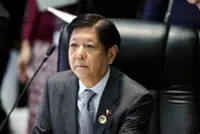ELECTION hopefuls like mayoral candidate Kerwin Espinosa have to ask themselves whether the job is worth taking a bullet.
The country’s elections commission, Comelec, recorded 46 acts of political violence between Jan 12 and April 11, including the shooting of Espinosa.
Follow us on our official WhatsApp channel for breaking news alerts and key updates!
Thank you for your report!





